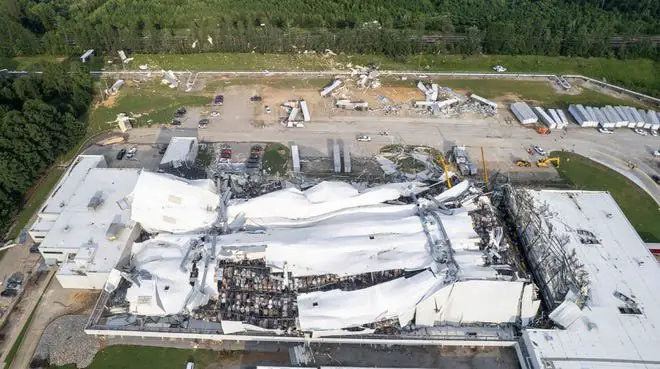The fallout from a Pfizer factory damaged by a tornado could put even more pressure on already strained drug supplies to US hospitals, experts say.
Wednesday’s tornado struck near Rocky Mount, North Carolina, and ripped through the roof of a Pfizer factory that produces nearly 25 percent of all sterile injectable medicines used in U.S. hospitals, according to the drugmaker.
Pfizer said all employees have been safely evacuated and accounted for and it is still assessing the damages.
Here’s a closer look at the possible effects.
What are Sterile Injectables?
The North Carolina plant produces injectables as drugs that are used in intravenous infusions or that are administered under the skin or into the muscles of the patient.
The plant produces anesthetic drugs, anti-infectives (which typically treat things like fungal infections), and drugs that temporarily paralyze muscles. The latter are used in outpatient clinics or intensive care units for patients on mechanical ventilation, said Mike Ganio, who studies drug shortages at the American Society of Health-System Pharmacists.
The Pfizer site does not manufacture or stock the company’s COVID-19 vaccine or Comirnaty and Paxlovid treatments.
How big is the site?
Pfizer bought the eastern North Carolina factory in 2015 as part of its acquisition of drugmaker Hospira.
There’s more than 1.4 million square feet of manufacturing space, or the equivalent of more than 24 soccer fields and 22 packing lines.
Pfizer says more than 2,000 people work there.
How will this affect hospital drug supplies?
It will likely lead to some long-term shortages as Pfizer moves production to other locations or rebuilds, said Erin Fox, senior director of pharmacy at the University of Utah Health.
But the details of which drugs might be affected by a shortage and how long that shortage will last are unclear.
Anyone who knows about this event is basically holding their collective breath at this point, hoping for the best and waiting for news, Ganio said.
He noted that drugmakers tend to ship finished products from manufacturing sites quickly, which could limit the amount of inventory damaged by the tornado.
How can hospitals manage shortages?
They have different tools to mitigate the impact for patients.
Some hospitals have begun to build up stocks of stored medicines instead of relying on regular deliveries from a wholesaler. Ganio said that’s especially true for drugs that hospital executives know will be hard to get.
Hospitals can also switch to different forms of a drug by giving a patient an antibiotic pill instead of an IV if that person can handle it. If a larger vial of a drug is more readily available, they may order it and then fill several syringes with smaller ready-to-use doses.
Aren’t hospitals already addressing drug shortages?
Yes, it has been happening for years. But right now, hospitals are specifically experiencing shortages of things like chemotherapy drugs.
The impact of drug shortages is not limited to hospitals. They also affect more routine care provided through pharmacies and doctor’s offices.
Overall, there were 309 active drug shortages in the United States at the end of June, according to the University of Utah Drug Information Service. An increase from 295 at the end of last year and the highest total recorded since 2014.
What will Pfizer do?
The company hasn’t said what happens next.
Drug makers can move production to other locations. But that can be tricky because they have to reroute raw materials usually produced elsewhere to other places and may have to train workers to make a product.
Pfizer may also need to figure out whether to cut production of another product to ramp up production at the new site.
Now it’s always as easy as flipping a switch to ramp up production, Ganio said.
Associated Press reporters Gary Robertson in Raleigh, North Carolina, and JoNel Aleccia in Temecula, California, contributed to this report. Murphy reported from Indianapolis.
The Associated Press’s health and science department receives support from the Howard Hughes Medical Institutes Science and Educational Media Group. The AP is solely responsible for all content.
#Tornado #damage #Pfizer #plant #create #longterm #shortages #drugs #hospitals
